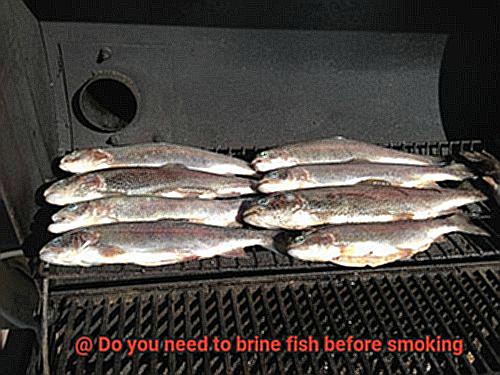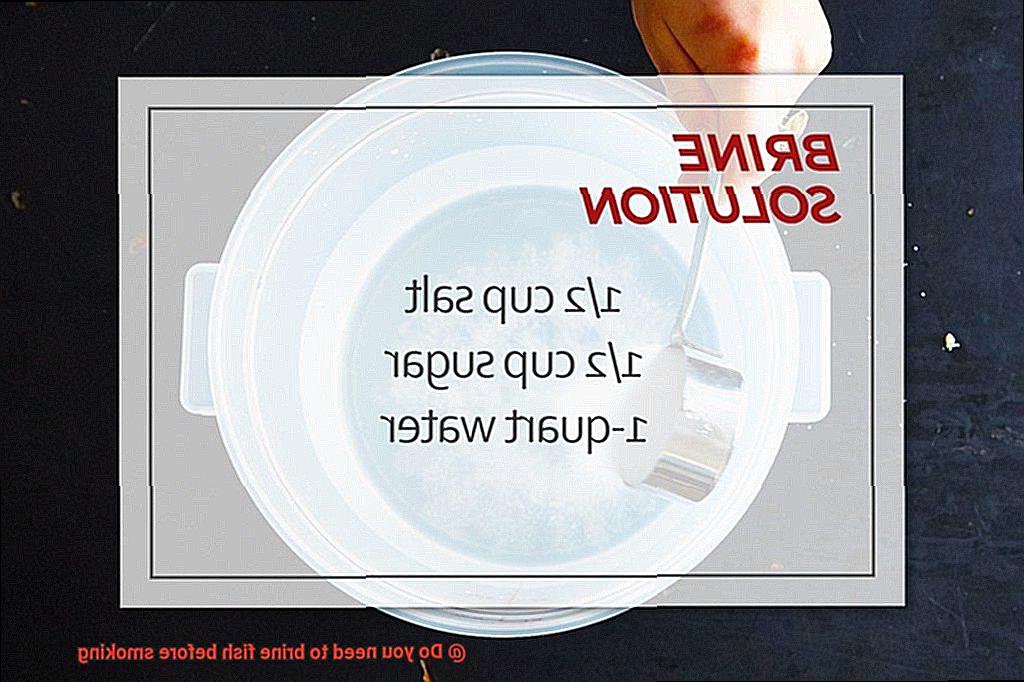Smoked fish is a timeless delicacy that has tantalized taste buds for centuries. Whether it’s the succulent flavor of salmon, the rich taste of trout, or the boldness of mackerel, smoking fish is an art form that requires skill and patience. But before you fire up your smoker and start cooking, there’s one critical question that begs to be answered: do you need to brine fish before smoking?
Brining involves soaking the fish in a saltwater solution before smoking it. This process adds moisture and flavor while keeping the flesh tender and preventing it from drying out. Some chefs swear by brining as a necessary step for any smoked fish, while others argue that it’s not essential.
In this blog post, we’ll delve deep into the debate and explore the benefits of brining your fish before smoking it. We’ll also examine various brining techniques and uncover the science behind why this process works so well. By the end of our journey together, you’ll have a definitive answer to whether or not you should brine your fish before smoking it.
So let’s roll up our sleeves (and maybe put on an apron) as we dive into this delicious topic.
Contents
What Is Brining?
Have you ever tasted dry, flavorless smoked fish, and wondered how to avoid it? The answer lies in the ancient technique of brining.
Brining is a process where food is soaked in a saltwater solution before cooking. For centuries, this technique has been used to preserve food and enhance its flavor and texture. When it comes to smoking fish, brining is an essential step that can take your dish from mediocre to mouth-watering.
The basic ingredients of a brine are salt, sugar, and water. But why stop there? Other flavorings such as herbs, spices, and citrus can also be added to the mix to enhance the taste of the fish. The amount of salt in a brine can vary depending on personal preference, but a general rule of thumb is to use about 1 tablespoon of salt per cup of water.
Brining times can also vary depending on the size and thickness of the fish. For smaller fillets or pieces of fish, brining for 30 minutes to an hour should suffice. For larger whole fish or thicker cuts, brining for several hours or even overnight may be necessary.
The benefits of brining fish before smoking are numerous. First and foremost, it helps to keep the fish moist and tender during the smoking process. This is particularly important for lean fish like salmon, which can easily dry out when smoked. Secondly, it enhances the flavor of the fish by infusing it with the flavors of the brine. This can include anything from garlic and dill to soy sauce and brown sugar. Finally, it can help to reduce cooking time by partially cooking the fish during the brining process.
But don’t just take our word for it – try it out for yourself. While it’s not necessary to brine every piece of fish before smoking, those who want to achieve the best possible results should consider brining as an essential step in the process. Experiment with different flavor combinations, brining times, and types of fish to find the perfect recipe for you.
Benefits of Brining Fish Before Smoking
The solution to your problem might just be brining. By soaking your fish in a saltwater solution before smoking, you’ll be able to elevate its taste and texture to new heights.
So, what exactly are the benefits of brining fish before smoking? Let’s take a closer look:
- Adds Flavor: Brining infuses your fish with a delicious salty flavor that will leave your taste buds begging for more. But why stop there? You can experiment with different herbs, spices, and seasonings to create a custom flavor profile that perfectly suits your tastes.
- Retains Moisture: One of the biggest challenges when smoking fish is keeping it moist and tender. Thankfully, brining helps to solve that problem by breaking down the protein in the fish and allowing it to absorb water. The result? Juicy, succulent smoked fish that’s sure to impress.
- Ensures Even Seasoning: When you smoke fish without brining it first, there’s a risk that the seasoning will only penetrate the surface of the fish. But by brining it beforehand, you can rest assured that every part of the fish will be evenly seasoned for maximum flavor.
- Reduces Cooking Time: Brining can actually help speed up the smoking process by breaking down the proteins in the fish and allowing it to cook more quickly and evenly. This means less time spent waiting for your fish to smoke and more time spent enjoying it.
Types of Fish Suitable for Brining
When it comes to smoking fish, brining is often recommended to enhance the flavor and texture of the fish. However, not all types of fish are created equal, and some may not be suitable for brining. Here are five sub-sections that detail the types of fish that are suitable for brining before smoking:
Fatty Fish
Fatty fish such as salmon, trout, and mackerel are excellent candidates for brining because they have a robust flavor that can benefit from the added seasoning. Additionally, the high fat content in these fish helps them retain moisture during the smoking process. Brining these types of fish can help to balance out the bold flavor and create a tender, juicy texture.
Leaner Fish
While leaner fish such as cod, halibut, and snapper can also be brined before smoking, it’s essential to exercise caution to avoid over-brining that can result in a mushy texture. These types of fish have a firmer texture compared to oily fish, and they may not absorb the brine as effectively. As such, these types of fish may benefit from a shorter brining time or a milder brine solution.
Shellfish
Shellfish such as shrimp and scallops can also benefit from a quick brine before smoking. A quick soak in a brine solution helps to enhance their natural sweetness and prevent them from drying out during the smoking process. It’s crucial to note that shellfish can absorb the flavors of the brine relatively quickly, and so it’s best to limit the time they soak in the solution.
Delicate Whitefish
Delicate whitefish such as tilapia or sole may not be suitable for brining before smoking. These types of fish have a mild flavor that could easily be overwhelmed by the saltiness of the brine solution. Over-brining delicate whitefish could also result in a loss of their delicate flavor and texture. It’s best to avoid brining these types of fish altogether or to use a very mild brine solution.
Size of Fish
The size of the fish also plays a vital role in determining whether or not to brine before smoking. Larger fish like salmon may benefit from brining to ensure that the flavor penetrates all the way through the meat. Smaller fish, on the other hand, may not require as much time in the brine and may become too salty if left in the solution for too long.
How Long Should You Brine Fish?
If you’re a smoked fish connoisseur, you know that brining is critical to achieving that perfect flavor and texture. But when it comes to how long to brine fish, there are a few factors to consider. Let’s dive in.
The type of fish you use is the first consideration. Oily fish like salmon and mackerel require a shorter brining time, while lean whitefish like cod and halibut might need a longer soak. This is because oily fish already have more natural oils that can keep them moist during smoking.
Next up is the size of your fillets or whole fish. Bigger fish may need a longer brining time to ensure that the flavors penetrate through the meat. Some experts recommend brining large salmon fillets for up to 12 hours, while others suggest a more modest 2-4 hour brine.
Personal preference also plays a role in how long you should brine your fish before smoking it. If you want a more subtle flavor, opt for a shorter brining time. If you prefer a stronger flavor, go for a longer soak.
So, how long should you brine your fish? In general, it’s recommended to brine for at least 30 minutes and up to a few hours. This gives the fish ample time to absorb the flavors of the brine and helps keep it moist during smoking. However, be careful not to over-brine your fish, as this can lead to an overly salty taste and mushy texture.
It’s worth noting that some experts suggest experimenting with different brining times to find what works best for you. Start with a shorter brining time and taste test your smoked fish after it’s done. If you feel that it could benefit from a longer brine, adjust accordingly for your next batch.
What Is the Best Salt to Use for Brining?
Look no further. The type of salt you use can make or break the taste and texture of your smoked fish. As an expert in this field, I highly recommend using kosher salt for your brine.
Why kosher salt, you ask? Firstly, it dissolves easily and evenly, ensuring that your fish is seasoned consistently throughout. You don’t want to end up with some parts of the fish being too salty while others are bland. With kosher salt, you can be sure that the seasoning is just right.
Another advantage of using kosher salt is that it doesn’t contain any additives such as iodine or anti-caking agents that may affect the flavor of your fish. These additives are commonly found in table salt and can leave a bitter taste on your smoked fish. You want the natural flavors of your fish to shine through, and using kosher salt can help achieve just that.
While kosher salt is the top choice for brining fish before smoking, sea salt can also be a great option. It’s important to note that sea salt comes in different varieties such as coarse or fine, so it’s essential to choose the right type for your recipe. However, sea salt can be more expensive than kosher salt.
When measuring salt for your brine recipe, it’s crucial to use weight measurements rather than volume measurements. This ensures that you’re using the correct amount of salt for the amount of water being used in the brine.
What Are the Risks of Not Brining Your Fish?
While some may argue that it’s an unnecessary step, the risks of not brining your fish cannot be ignored.
Firstly, without the added moisture from the brine, your fish can easily become dry and tough during smoking. This could result in a less enjoyable end product that’s difficult to chew. Brining ensures that your fish retains its natural moisture and flavors, resulting in a succulent and delicious end product.
Secondly, without brining, your fish may not hold its shape well during smoking and could easily fall apart or become too soft. This can be frustrating when serving and presenting your smoked fish to guests. By brining your fish, it will hold its shape better during smoking, making for a perfect presentation.

Lastly, not brining your fish could also increase the risk of foodborne illness caused by harmful bacteria. Brining helps to kill off any bacteria on the surface of the fish, making it a safer option for those concerned about food safety. By skipping this step, you could put yourself and others at risk of getting sick.
Alternatives to Brining Fish Before Smoking
Smoking fish is a delicious way to infuse it with flavor and increase its shelf life, but brining can be a time-consuming process. Luckily, there are several alternatives that can yield equally savory results.
One option is dry-curing. By rubbing a mixture of salt, sugar, and any desired herbs or spices onto the fish and letting it sit in the refrigerator for several hours, the salt and sugar draw out moisture from the fish, which helps to preserve it and enhance its flavor. Plus, dry-curing can result in a firmer texture than brining.
Another alternative is marinating the fish in an acidic solution like vinegar or citrus juice, which helps to break down the proteins and make the fish more tender. Additionally, acidic marinades add flavor and help to kill any harmful bacteria. However, over-marinating can turn your fish into mush.
Skipping the brining or curing process altogether can also work well for fatty fish like salmon or mackerel, which are already moist and flavorful. However, leaner fish may benefit from some sort of pre-smoking treatment to prevent them from drying out.
Tips for Successfully Smoking Your Fish After Brining
Smoking fish is a delicious way to add depth and complexity to your meals, but brining your fish beforehand can take it to the next level. Brining involves soaking your fish in a saltwater solution, which not only enhances the flavor but also helps keep it moist during smoking. In order to achieve the perfect smoked fish, there are a few key steps you need to follow. Here are some tips for successfully smoking your fish after brining:
Choose your fish wisely
Not all fish need to be brined before smoking. Fatty fish like salmon benefit greatly from brining, while leaner fish like trout or cod may not require it. Keep in mind that brining can still add flavor and tenderness to these leaner fish.
Mix up your brine
The right ratio of salt to water is essential when making your brine solution. Typically, a 1:1 ratio of kosher salt to water is recommended, but you can also add other flavorings like sugar, herbs, or spices to enhance the taste of your fish.
Brine for the right amount of time
The length of time you should brine your fish depends on its size and thickness. Smaller pieces of fish will need less time in the brine – around 30 minutes to an hour – while larger pieces may take several hours or even overnight. Be sure not to over-brine your fish as this can result in a mushy texture.
Rinse and dry your fish
After removing the fish from the brine solution, rinse it thoroughly under cold water to remove any excess salt or flavorings. Pat the fish dry with paper towels or a clean cloth before letting it air dry for 30 minutes to an hour. This will help form a pellicle on the surface of the fish which will hold in moisture during smoking and absorb smoke flavor.
Smoke with care
Use a smoker to smoke your fish and control the temperature and smoke level. Fatty fish like salmon require a higher temperature than leaner fish like trout. Monitor the temperature of your smoker to ensure it stays within the recommended range for your type of fish. Generally, smoking temperatures range from 150-225°F, and smoking times can vary from 1-4 hours depending on the size and type of fish.
whhVEiHD5m4″ >
Conclusion
In conclusion, brining fish before smoking is a fundamental step that can elevate your smoked fish game to new heights. Not only does it keep the fish juicy and tender throughout smoking, but it also imparts an irresistible flavor by infusing it with the brine’s essence while ensuring even seasoning and reducing cooking time. However, not all fish are created equal, and some may not be suitable for brining. Therefore, it’s crucial to exercise caution and avoid over-brining that can result in a mushy texture.
Selecting the right salt for your recipe is paramount when brining fish before smoking. Kosher salt is highly recommended as it dissolves effortlessly and evenly without affecting your fish’s flavor profile. Additionally, personal preference plays a pivotal role in determining how long you should brine your fish before smoking.
While there are other pre-smoking treatments such as dry-curing or marinating in an acidic solution like vinegar or citrus juice that can yield equally delicious results, skipping this essential step altogether may not be ideal for leaner fish.
To ensure mouth-watering smoked fish after brining, start by selecting high-quality fish and mixing up your brine with other ingredients like sugar, herbs or spices to create unique flavors. Once you remove the fish from the brine solution, rinse and dry it thoroughly before placing it in the smoker.






